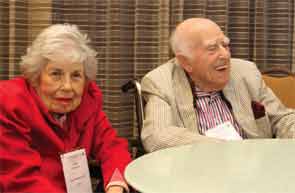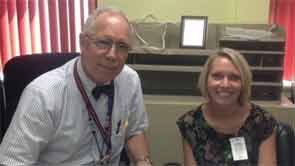
At 103 years old, Ephraim Engleman, MD, is still making a mark in the world of rheumatology. Wanting to stay active, he still goes to work at the University of California San Francisco and continues to see a few patients. However, Dr. Engleman’s influence is reaching beyond the day-to-day tasks in the office. He is helping shape the future of the field through his work with the Rheumatology Research Foundation.
About a decade ago, Dr. Engleman started working with the Rheumatology Research Foundation to develop an award that would build more interest in rheumatology among residents by allowing them to get in-depth experience in the field. The partnership led to the Ephraim P. Engleman Endowed Resident Research Preceptorship, which funds a full-time research experience for a resident under the guidance of a mentor.
In fiscal year 2006, the Foundation awarded the first Engleman preceptorship. To date, 10 residents have received the award and completed a research project with the help of their preceptors. In October 2013, the recipients of the award were given an extraordinary opportunity. The 2013 ACR/ARHP Annual Meeting was hosted in Dr. Engleman’s home state. So he and his wife made the trip to San Diego to meet the rheumatologists whose careers he has influenced so greatly through his award.
All 10 doctors who received the award and their preceptors were invited to a special event to meet the Englemans. For those in attendance, it was an incredible experience.
“When I found out about the meet-and-greet with Dr. Engleman, I was thrilled,” says Miriah Gillispie, MD, the most recent recipient of the preceptorship. “It was amazing to meet a predecessor who is so enthusiastic about the field of rheumatology and continuing advancements in research.”
Dr. Engleman has been practicing medicine for more than six decades. He established himself as a leader in the field by serving as president of several national and international professional organizations, including the American College of Rheumatology. In 1975–76, he chaired the National Commission on Arthritis, a congressional task force charged with developing recommendations on how to address the lack of arthritis research and adequate patient care. The Commission’s work resulted in the creation of what is now known as the National Institute of Arthritis and Musculoskeletal and Skin Diseases.
Even with such an impactful, long-lasting career, Dr. Engleman continues focusing on helping the next generation of rheumatology professionals. Many of the award recipients who spoke with Dr. Engleman say he expressed genuine interest in the work they conducted during their preceptorships.
“He was very interested in the outcome of my study and even asked that a copy of my completed research be sent to him,” explains Dr. Gillispie. “Not only that, he seemed interested in me as a person,” she says.
In fall 2013, Dr. Gillispie conducted research under the guidance of James Jarvis, MD. They analyzed how long it took children with juvenile idiopathic arthritis to reach clinical remission on methotrexate and whether the medicine had to be paired with a biologic.
Other award recipients at the event had similar encouraging interactions with Dr. Engleman. Cecilia Chung, MD, MPH, an assistant professor of medicine at Vanderbilt University in Nashville, Tenn., also had the opportunity to speak with Dr. Engleman. She was awarded her preceptorship in fiscal year 2010 and was mentored by Joan Bathon, MD. Dr. Chung, Dr. Bathon and a multidisciplinary team studied atherosclerosis in patients with rheumatoid arthritis (RA). Their work led to two published papers providing important information on identifying health risks when treating people with rheumatic diseases.

One paper showed that cardiovascular risk factors, such as hypertension, smoking and diabetes, are highly prevalent and underdiagnosed in patients with RA.
The other study showed that in patients with RA, the risk of developing atherosclerosis was related to age, blood pressure and high triglyceride levels. Dr. Chung says she spoke with Dr. Engleman about the research she conducted during her preceptorship and shared the papers with him after the event.
“It is inspirational to feel Dr. Engleman’s enthusiasm and energy,” says Dr. Chung. “He had kind words about my research, but even more encouraging words regarding the future of my career.”
Also among the crowd were the first two doctors to receive the award, Elizabeth Perkins, MD, and her preceptor, George Moxley, MD. Dr. Moxley says it was an honor to meet Dr. Engleman in person. “I must admire such a man who recognized the situation—that young physicians were not considering rheumatology because they encountered it too late in their medical education—and did something truly effective about it,” he says. Dr. Moxley is serving as a preceptor again. He and Daniel L. Riddle, PhD, MS, will mentor Melissa Wang, MD, MHA. They were awarded the Foundation’s Resident Research Preceptorship in January.
To Drs. Gillispie, Chung and Moxley, Dr. Engleman has provided them something more than an opportunity to conduct a few months of research. Through the Foundation’s Engleman preceptorship, he supported an experience that has helped shape the careers of Drs. Gillispie and Chung and enhanced Dr. Moxley’s work.
For Dr. Gillispie, the preceptorship allowed her the opportunity to prepare for her future. “This award definitely helped shape my goals,” she explains. “It gave me dedicated time for research that I likely would not have gotten otherwise. It also allowed me a glimpse into things that will be expected of me as a fellow.”
Dr. Chung says before her preceptorship, she knew she wanted to pursue a career in rheumatology, but the experience cemented her decision to become an investigator. “I am very grateful to Dr. Engleman for supporting a program that gives the opportunity to start a research project under the mentorship of an accomplished investigator,” she says. “In particular, I am thankful for an experience that further increased my interest in a career in academic rheumatology with a focus on research.”
For Dr. Moxley, being a preceptor provides him the opportunity to help build the future of the field through the next generation of rheumatologists, but it also offers something special for an established professional. “My career satisfaction is enhanced,” he explains. “Being around a young physician who is energetic, interested and seeing things for the first time makes a person feel that the future is brighter and in good hands.”

